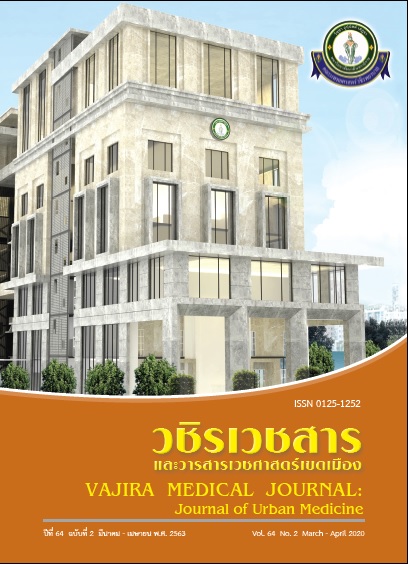Food Consumption Behaviors of Third-Year to Fifth-Year Medical Students at the Faculty of Medicine Vajira Hospital
Main Article Content
Abstract
Objective: To study the food consumption behaviors, attitudes towards food consumption and factors relating to food consumption behaviors of third-year to fifth-year medical students at the Faculty of Medicine Vajira Hospital.
Methods: The study design was cross-sectional descriptive study. The data were collected by questionnaires. The samples were a total of 170 third-year to fifth-year medical students, Faculty of Medicine Vajira Hospital, Navamindradhiraj University, academic year 2016. Data were analyzed by using frequency, percentage, mean, standard deviation, median, interquartile range, Mann-Whitney U Test, and Kruskal-Wallis Test, p-value less than 0.05 was considered statistically significant.
Results: The food consumption behaviors of medical students had a moderate level (84.1%), good level (15.9%). The attitudes towards food consumption had a good level (60.0%), moderate level (38.2%), and low level (1.8%). Class times start, age, and attitudes towards food consumption were factors associated with food consumption behaviors at the 0.05 significant level.
Conclusion: The food consumption behaviors of medical students had a moderate level and attitudes towards food consumption had a good level. Medical students had class times start, age, and attitudes towards food differed were different in food consumption behaviors. These findings should be used to promote appropriate food consumption behaviors of medical students.
Downloads
Article Details
References
Saengrussamee V. Cosumer behavior for fastfood case study of bachelor degree university students in kasetsart university [dissertation]. Bangkok: Kasetsart University; 2015.
Economic Intelligence Center. Shining consumer behavior in the globalized era ... businesses that have to answer more than just stomach fullness [Internet]. EIC analysis; 2014 [cited 2017 Sep 20]. Available from: https://www.scbeic.com/th/detail/product/600.
Piaseu N, Tatsanachantatanee D, Kittipoom S, Putwatana P. Nutritional knowledge, attitude toward food, food behavior, and nutritional status among nursing students. Rama Nurs J 2009;15(1):48-59.
Keeratipish A. Looking at the future of convenience stores [internet]. 2017. bangkokbiznews; 2016 [cited 2017 Sep 20]. Available from: https://www. bangkokbiznews.com/blog/detail/638814.
Musikthong J, Sriyuktasuth A, Kongkar R, Sangwichaipat N. Nutritional knowledge, attitude towards food, food consumption behavior, and nutritional status in nursing students, faculty of nursing, mahidol university. J Nurs Sci 2010;28(3):40-9.
Pitanupong J, Jatchavala C. Atypical eating attitudes and behaviors in Thai medical students. Siriraj Medical Journal 2017;69(1):5-10.
Intachai P. Food consumption behavior of undergraduate students at mission college [dissertation]. Bangkok: Srinakharinwirot University; 2004.
National Statistical Office, Ministry of Information and Communication Technology. The 2013 food consumption behavior survey. Bangkok.2014.
Malak Eisa Abdalla AI-Haj, Hiba A Awooda, Mustafa Khidir Mustafa Elnimeiri. Eating habits among medical students in a Sudanese medical faculty. International Research Journal of Medicine and Medical Sciences 2015;3(3):64-9.
Abdel-Hady Abel Fattah El-Gilany, Doaa Mohamed Abdel-Hady, Randa El Damanawy. Consumption and knowledge of fast/junk foods among medical students, Mansoura University, Egypt. TAF Prev Med Bull 2016;15(5):440-5.
E. M. Ackuaku-Dogbe, B. Abaidoo. Breakfast eating habits among medical students. Ghana Medical Journal 2014;48(2):66-70.
Matayae R. Food consumption behavior of thai muslim in rural communities responsibility area of banrae primary care unit, tambon banrae, amphoe thanto, changwat rala [dissertation].Yala: Sirindhorn College of Public Health, Yala; 2007.
Best, John W. Research in Education. 3rd ed. Englewood Cliffs, New Jersey: Prentice Hall, Inc;1977.
Sirichote T. Knowledge, attitudes and behaviors about food consumption of songkhla rajabhat university undergraduate students [dissertation]. Songkhla: Songkhla Rajabhat University; 2014.
Ponsiri A. Knowledge, attitudes and behaviors about food consumption of ramkhamhaeng university undergraduate students. Ramkhamhaeng Research Journal 2008;11(1):49-60.
Ruangying J, Jorajit S, Janyam K. Food consumption behavior of adolescents in songkhla province: synthesis of literacy and factors influencing food consumption behavior. Journal of Liberal Arts, Prince of Songkhla University, Hat Yai Campus 2016;8(1):245-64.
Cheunnoy N, Srisiri S. Prediction factors of food consumption behavior among first year undergraduate students in srinakharinwirot university. In: Choeychuen K, editor. Creative RMUT and Substainable Innovation for Thailand 4.0. Proceeding of the 9th Rajamangala University of Technology National Conference and the 8th Rajamangala University of Technology International conference; 2017 Aug 7-9; Impact Muang Thong Thani Exhibition and Convention, Nonthaburi, Thailand. 2017. p. 947-57.
Radha R. Ramaiah. Eating disorders among medical students of a rural teaching hospital: a cross-sectional study. Int J Community Med Public Health 2015;2(1):25-8.
Panchami, Teenu Samuel. A cross-sectional study of disturbed eating attitudes and behaviours in medical students. Int J Res Med Sci 2016;4(7):2830-3.
Deotale MK, Ranganathan U, Akarte S. V. Prevalence of overweight and obesity among medical students and their knowledge, attitude and practices about obesity. Int J Sci Rep 2015;1(1):74-9.


